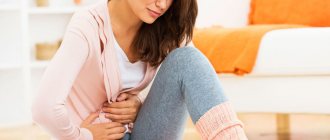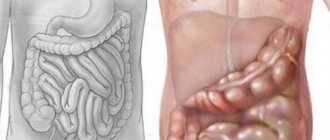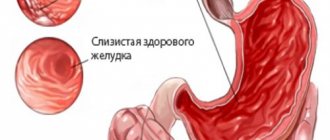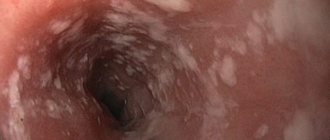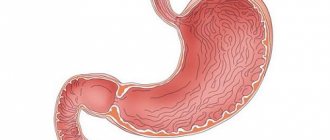When should you call a doctor? When does a patient need hospitalization?
The main danger of diarrhea is dehydration. This is what we should build on. A doctor should be called if diarrhea cannot be stopped with “improvised” means. Indications for urgent hospitalization are as follows:
- temperature above 38 degrees;
- blood clots in stool or vomit;
- symptoms of severe dehydration (dry skin, dark circles, sluggish movements, confusion);
- severe vomiting, which does not allow fluid balance to be restored.
In mild cases, treatment of diarrhea after chemotherapy includes rehydration and elimination of symptoms; in severe cases, symptomatic care is needed (rehydration through a drip, antiemetics, intestinal antiseptics).
Drug treatment of diarrhea grades 1 and 2
Before treating diarrhea, the patient is asked to undergo a full examination. Hospitalization for grade 1 and 2 diarrhea is not required. To combat the disorder, the patient is prescribed medications to normalize the water-salt balance and antispasmodics to help eliminate stomach pain.
We recommend: What to do if an adult has severe watery diarrhea?
Neointestopan has proven itself well in the treatment of diarrhea during chemotherapy. This is an adsorbent that has the ability to bind toxins and remove them from the body. At the same time, the drug effectively works against pathogenic microorganisms, normalizing the balance of beneficial intestinal microflora.
Regidron is traditionally used to normalize water and electrolyte balance and prevent dehydration. It is recommended to give preference to No-shpe or Baralgin as analgesics.
Drug treatments used to suppress the activity of cancer cells negatively affect other cells in the body. In addition, diarrhea due to cancer, even mild forms, is often accompanied by blood loss. All together this leads to the development of iron deficiency anemia. To increase the level of hemoglobin in the blood of cancer patients, Erythropoietin, Totema and other drugs of this group are used. As an adjuvant therapy, treatment can be supplemented with glucocorticosteroids.
Traditional methods of treatment
Traditional methods to stop diarrhea range from simple and general to very complex:
- The leader among folk methods is definitely the usual compote. It replenishes the lack of fluid in the body and gives the latter the necessary vitamins and microelements. For compote, it is better to use apples, pears and blueberries.
- Rice water, due to its stickiness, acts in the same way as sorbents. The recipe is simple: you need to cook regular rice, strain and cool the water, and then drink a glass 3-4 times a day.
- A chicory-based decoction may help. You need to boil several branches for 5-10 minutes, then pour the broth somewhere and drink half a glass when diarrhea occurs.
- Another fastening agent is walnut shells. You need to take a small saucepan, fill it halfway with shells and completely fill it with water. Cook for an hour over low heat. Drink 100 g twice a day.
- Diarrhea can be overcome with the root of the serpentine plant, if you can find it. The roots need to be washed, placed in a container and filled with boiling water. Leave for 4 hours. Drink 2 spoons 3 times a day.
Alternative treatment can help in mild cases.
If they fail to stop diarrhea, you need to try medications.
How to get rid of diarrhea after chemotherapy
In order to stop diarrhea, complex treatment is required, including the use of medications, changes in diet and type of diet, as well as the use of effective folk methods.
In severe cases, in the presence of severe dehydration and electrolytic imbalance, the only way to get rid of the problem is through inpatient treatment in a hospital.
Treatment of the disorder when using “chemistry” includes the use of the following means:
- Probiotics to restore beneficial and inhibit the growth of pathological intestinal microflora (Bifidumbacterin, Enterol, Probifor, and so on).
- Pancreatic enzymes that stabilize the process of food digestion (Creon and others).
- Ringer's solution to replace lost electrolytes. As an option - Regidron.
- Sorbents (enterosorbents) that help remove toxins from the patient’s body (Smecta, Enterosgel, Neointestopan adsorbent).
- Loperamide is a drug used to treat diarrhea. It reduces intestinal motility and reduces the production of fluid by its walls. Another drug with a similar effect is Enterobene.
Activated charcoal is prohibited for treating indigestion after chemotherapy drugs!
Any medicine must be approved by the attending physician.
In order to relieve diarrhea, traditional healers use substances containing tannins and having an astringent effect:
- Oak bark is the most common and accessible remedy for stopping diarrhea.
- Pharmaceutical camomile.
- Marsh cinquefoil.
- St. John's wort.
- Blueberry.
- Kalgan.
- Chicory.
An effective and affordable remedy is a decoction of walnut shells, which is easy to prepare at home. To do this, a handful of cleaned and washed raw materials are completely filled with water and boiled for a quarter of an hour, then cooled and filtered.
The resulting drink should be the color of black tea. You need to take it 125 ml (half a glass) three times a day. The decoction quickly fixes the stool and helps cope with the disorder.
If loose stools appear, patients are advised to stop taking cytostatics. To compensate for fluid loss, the patient is prescribed rehydration drugs (Regidron, Hydrolyte). They help restore electrolyte balance in the patient’s body.
Cancer patients undergoing chemotherapy sometimes complain of stomach and abdominal pain. Spasms can be relieved with the help of antispasmodics (Baralgin, No-shpa). The cells of the intestinal mucosa are especially sensitive to chemotherapy.
When they are destroyed, the patient develops ulcers. This leads to disruption of the digestive system. After a course of chemotherapy, the patient may experience heaviness in the stomach after eating fatty foods.
Decreased immunity can lead to the emergence of infectious diseases in cancer patients. The patient often begins to experience diarrhea due to eating inappropriate food. In this case, you need to completely exclude the corresponding foods from the diet.
If you have diarrhea, you need to take adsorbents. Neointestopan is especially effective, helping to remove toxins and pathogenic microorganisms from the patient’s body. The product not only eliminates toxic effects. Neointestopan affects the contractile function of the intestine. After taking the drug, the patient’s microflora gradually normalizes. But there are other high-quality sorbents with bifidobacteria and lactobacilli adsorbed on the surface of activated carbon.
If painful sensations appear, patients are advised to take No-shpa; in severe cases, the doctor prescribes Platiphylline.
To treat diarrhea, Loperamide is used, which slows down the movement of stool through the intestines. However, for some people, the drug causes headaches and nausea. In this case, you should stop taking the drug and consult a doctor immediately.
To reduce the symptoms of anemia due to blood loss, patients are prescribed Erythropoietin. The product helps restore the amount of iron in the body. This drug, as well as red bone marrow stimulants, are prescribed to patients by oncologists.
Diet
The difficulty in choosing the right diet is that chemotherapy usually needs to be continued even if it is complicated by diarrhea. Simply eliminating all dangerous foods will not work. List of foods that can be consumed for such diarrhea:
- rice in any form;
- oatmeal;
- dried bread, crackers;
- boiled (hard-boiled) eggs;
- vegetables without peel (but not sour);
- with caution: boiled chicken (up to 200 g per day), fish, buckwheat, boiled potatoes.
Diet for treating illness
A properly balanced diet is important when fighting diarrhea during chemotherapy. First of all, experts recommend that patients unload their intestines. To do this, you should drink a lot of still mineral water. The next day, you can introduce light liquid dishes that are steamed into your diet.
A diet for diarrhea after chemotherapy must be followed without fail. The patient must avoid taking high-calorie foods, fatty fish and meat, smoked meats, spicy foods, marinades, and salty foods. You should not eat onions, garlic, radishes, radishes, fruits, sour berries, legumes and other heavy and irritating foods to the gastrointestinal tract.
To prevent diarrhea from developing after chemotherapy, patients should adhere to a diet.
Fiber and rough, fibrous foods should be limited. Fatty, fried foods and alcohol are excluded. Vegetables and fruits must be peeled.
Patients with similar symptoms should eat small and frequent meals. Doctors allow the consumption of white bread, crackers, rice porridge, boiled eggs, low-fat cottage cheese and lactic acid products, low-fat boiled fish and meat.
It is especially important to regulate your diet if you have diarrhea. The stomach and intestines of a person suffering from diarrhea are not able to perceive the volume and quality of food that is usually offered. Therefore, a properly formulated diet is the key to successful treatment. Let's look at the basic rules.
- On the first day of diarrhea, it is suggested to unload your digestive tract. To do this, all food products are excluded from the diet. Only still mineral water and rehydration medications are allowed. If you have an appetite, you can eat some crackers or lean rice porridge.
- On the second day, the diet involves eating light food with a liquid consistency. You can cook steamed vegetables or slimy porridges.
- On the third day, provided you feel well, the diet can be expanded with foods that do not irritate the mucous membrane of the digestive tract and do not contain difficult-to-digest fiber.
- From the third day of the diet, be sure to start introducing protein and potassium-rich foods into your menu.
- All food should be low-calorie, with zero or minimal fat content.
- Smoked meats, pickles, spices, fresh vegetables and fruits, legumes, berries, sweets and baked goods are prohibited. All this irritates the mucous membrane, is difficult to digest, provokes increased gas formation and causes a strong burden on the weakened intestines.
- The temperature of the food served should not be too low or high, as this may make it difficult to digest the food.
- It is recommended to chop or chew food thoroughly before serving.
- It is important to drink enough liquid throughout the entire period – at least 2 liters.
Can diarrhea be avoided after chemotherapy?
Diarrhea most often occurs due to cytostatics, and to a large extent it occurs randomly. It will not be possible to completely eliminate the possibility of its occurrence, but you can slightly reduce the chances. To do this, you need to adhere to general recommendations for gastrointestinal hygiene (do not drink alcohol, do not eat too much fried food, do not indulge in fast food) and treat infectious diseases in a timely manner (this helps to avoid dysbiosis). Naturally, during chemotherapy you need to tighten your diet by eliminating all provoking foods and liquids (juices, heavy meats, dairy products).
Diarrhea during chemotherapy is occasional and can range from mild to very severe. The help that a non-specialist can provide in this case is: maintaining an adequate level of fluid in the patient’s body and calling a doctor.
The latter should be called in case of severe diarrhea or any suspicious symptoms, and the sooner the better.
Causes
Diarrhea is a side effect of chemotherapy drugs.
Cytostatics used to treat cancer are toxic drugs aimed at stopping the activity of pathological cells. But they are not selective, so healthy cells are also damaged.
The intestinal mucosa and red bone marrow are most affected . Ulcerations appear on the walls of the intestines, leading to disruption of the absorption of nutrients.
This condition is accompanied by accelerated evacuation of contents, due to which the intestinal microflora is weakened and partially destroyed.
The main reasons for the development of digestive disorders during the treatment of malignant neoplasms are:
- The influence of drugs with a cytostatic effect.
- Leukopenia (low white blood cell count).
Additional factors may include accompanying diseases, for example, diabetes, poor or excess nutrition, infections, exposure to radiation therapy, and anxiety.
An intestinal disorder threatens to severely weaken the body's defenses, which leads to the development of infections, including the gastrointestinal tract. Diarrhea is complicated by vomiting, severe pain, flatulence, and increased body temperature.
Drugs
A highly effective drug called “Neointestopan”. At its core, it is an adsorbent. After intake, its active components settle on the intestinal mucous membranes, eliminating bacteria and toxic substances. The use of the drug reduces the frequency of bowel movements and normalizes the intestinal microflora.
The Finnish-made drug “Regidron” quickly restores the lack of salt and fluid in the body. The painful syndrome can be relieved by taking analgesic medications such as Platifilin, No-shpa, Baralgin. What other inexpensive diarrhea tablets can I use?
In addition, the patient is recommended to take Enterobene or Loperamide. When using these medications, undesirable reactions may develop in the form of vomiting, nausea, dry mouth, dizziness, migraines, and abdominal cramps.
A mild effect is achieved by taking the drug "Diosorb". It can be used to relieve diarrhea of any etiology. Diosorb acts as a strengthening agent on the intestinal mucous membranes. Side effects do not develop with its use. It can reduce the level of absorption of other medications, and therefore a certain period of time should be maintained between doses of medications.
Attapulgit and Neointestopan are highly effective in treating the manifestations of diarrhea. They normalize intestinal flora, reduce the number of bowel movements by removing bacteria and toxins from the intestinal cavity.
There are other diarrhea treatments available for adults.
III or IV degree of diarrhea
In severe cases, the patient is prescribed parenteral infusions of glucose, plasma and blood substitutes, and electrolyte solutions.
If diarrhea lasts two days or more, the drug Octreotide (Sandostatin) is used. It helps prevent shock and hypovolemia. Such treatment is carried out only in a hospital setting and under the supervision of a doctor.
Vitamins, antibiotics and antidiarrheal drugs are used. In this case, these are absorbents, atropine sulfate, opiates.
If diarrhea after chemotherapy in a patient is accompanied by a high temperature, then this serves as a signal that it is necessary to carry out antibacterial therapy. As a rule, broad-spectrum antibiotics are used for this.
Treatment after stool restoration consists of normalizing the intestinal microflora. For this purpose, the doctor has many biotic drugs in his arsenal.
Folk remedies for securing stool
To treat diarrhea, products with astringent properties are used:
- Potato starch. A tablespoon is dissolved in 100 ml of warm water.
- Rice water. Take 20 g of cereal per liter of liquid. The decoction is prepared for 1-1.5 hours.
- Oak bark. Take 10 g of crushed product per 300 ml of boiling water. The mixture is boiled for about 15 minutes. The amount of content during this time should decrease by 1.5 times. The broth is filtered. You need to take it 3 times a day, 20 ml.
- Blueberry decoction. Add 50 g of dried berries to 300 ml of water and cook for half an hour. The cooled product is taken 3 times a day, ½ cup.
Traditional methods of treatment are combined with taking medications.
Diarrhea after chemotherapy is common. To avoid complications, you should immediately consult a doctor for advice. Treatment must be combined with proper nutrition. Any relaxation in the diet can lead to re-liquefaction of the stool.
The information” on our website is provided by qualified doctors and is for informational purposes only. Don't self-medicate! Be sure to consult a specialist!
Author: Rumyantsev V. G. Experience 34 years.
Gastroenterologist, professor, doctor of medical sciences. Prescribes diagnostics and carries out treatment. Expert of the group for the study of inflammatory diseases. Author of more than 300 scientific papers.
Sometimes the only barrier between illness and death is chemotherapy. This treatment can hardly be called pleasant, but for malignant tumors there is no choice.
One of the disadvantages of this treatment is side effects, among which the most common is diarrhea. And if diarrhea occurs after chemotherapy, treatment (diarrhea) must be carried out, because the latter can lead to dehydration and worsening of side symptoms.
Ambulatory treatment
Any deterioration in health causes difficulties in treating cancer, so diarrhea should not be ignored. Perhaps the chemotherapy drugs will be stopped for a while. In difficult situations, they may be removed completely from the treatment regimen.
Each case is individual. Only a doctor who monitors the dynamics of tumor development can prescribe appropriate medications.
The method of combating diarrhea is chosen based on the severity of symptoms. For grades 1 and 2 of diarrhea, outpatient treatment is usually prescribed (at home or in a day hospital). The patient needs to replenish the salts and liquid lost in loose stools. For this purpose, electrolyte solutions are prescribed - Regidron, Gidrovit. Such drugs are produced in powder form. You can prepare your own saline solution at home.
For a liter of rehydrant you will need:
- a teaspoon of salt;
- a teaspoon of soda;
- 4 tablespoons sugar;
- a glass of apple juice.
All ingredients are mixed and boiled water is added to make 1 liter of product.
Absorbents
Activated carbon irritates the gastrointestinal tract after chemotherapy. It is better to replace it with sorbents in the form of a suspension - Smecta, Enterosgel. They are taken 2-3 times a day. You cannot use sorbents for a long time, since not only harmful substances, but also useful elements are removed from the body. When combining therapy, it should be taken into account that drugs in this group reduce the absorption of other drugs. The break between doses is 1.5 hours.
Probiotics
To normalize the ratio of beneficial microorganisms of the gastrointestinal tract and restore intestinal absorption, Probifor is used. This preparation contains a high concentration of living bacteria - 500 million units forming colonies. Acilact, Acipol, Linex can be used as maintenance therapy. The concentration of bacteria in them is several times lower than in Probifor. The duration of treatment of diarrhea with probiotics is 7-10 days.
Intestinal antiseptics
These drugs are prescribed if there is a suspicion of an infectious nature of diarrhea. After a course of chemotherapy, the immune system weakens from the administration of cytostatics with strong effects, so pathogenic microbes easily multiply in the gastrointestinal tract. For intestinal infections, drugs are prescribed - Enterofuril, Stopdiar, Nifuroxazide. They are effective for uncomplicated bacterial diarrhea. Galavit and Tamerit will help cope with diarrhea caused by a viral infection.
Drugs to reduce peristalsis
To stop diarrhea after using chemical drugs, medications based on loperamide are used. These include Imodium, Lopedium, Diara. They quickly slow down peristalsis, increase the tone of the anal sphincter, and reduce the flow of fluid into the intestinal lumen. Loperamide reduces the frequency and volume of loose stools, regardless of the cause of diarrhea.
Taking drugs based on Loperamide is not always justified. They can aggravate the situation if diarrhea is caused by an intestinal infection or peptic ulcer. Microbes remain in the intestines, which causes intoxication in the patient - weakness, fever.
Enzymes
Diarrhea can be caused by a lack of enzymes. In this case, the patient’s stool is yellow or grayish, in the form of a mush. The urge to go to the toilet occurs after eating. If there is a suspicion of deterioration in pancreatic function, Mezim, Creon, Panzinorm are prescribed.
Basic rules of diet for diarrhea after chemotherapy
It is recommended to stop diarrhea in the early stages with the help of symptomatic therapy (antidiarrheals), supportive treatment (restoring the concentration of electrolytes and water reserves of the body) and a special diet.
First of all, doctors advise drinking plenty of fluids (up to 5 liters per day, depending on the frequency of bowel movements). Recommended drinks are still water, weak tea, and Regidron solution.
During the period of complications, food should be easily digestible - pureed or liquid, steamed or boiled. You need to eat it little by little, but often, dividing a standard portion into 2-3 meals.
Fatty foods and dairy products are completely excluded from the diet. This diet must be followed for 2 weeks after completion of chemotherapy, after which the rest of the usual dishes can be gradually introduced into the menu.
In addition to dairy products, the following are prohibited during the diet:
- vegetables that irritate the intestinal mucosa and provoke flatulence (broccoli, radishes, beans, soy, garlic, onions);
- fatty fish;
- spicy, fatty, fried foods;
- confectionery, fresh bread, baked goods;
- coarse fiber foods (bran bread, etc.);
- nuts;
- pickles, smoked meats, pickled vegetables;
- caffeinated and alcohol-containing drinks;
- sparkling water;
It is recommended to reduce the volume of servings of vegetable and cereal dishes in the diet and more often consume foods low in fiber (hard-boiled eggs, rice, stale white bread, heat-treated apples). Fruits and vegetables must be peeled or peeled before consumption.
It is very important that the patient’s diet includes a large amount of foods with a high concentration of K (bananas, potatoes, and, less often, dried apricots). Along with the fluid, the body loses potassium, which is necessary for the full functioning of body systems (for example, the heart muscle).
It is better to eat potatoes in crushed form, and bananas should be included in the menu for second breakfast, afternoon snack and dinner, because on an empty stomach they negatively affect the balance of magnesium and potassium in the body.

